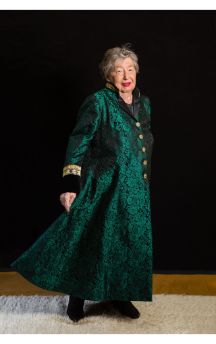
Sergeant Hamish Macbeth - Scotland's most quick-witted but unambitious policeman - returns in M.C. Beaton's new mystery in her New York Times bestselling series.
Nobody loves an honest man, or that was what police sergeant Hamish Macbeth tried to tell newcomer Paul English.
Paul attended church in Lochdubh. He told the minister, Mr. Wellington, that his sermons were boring. He told tweedy Mrs. Wellington that she was too fat. Angela Brody was told her detective stories were pap for the masses and it was time she wrote literature instead. He accused Hamish of having dyed his fiery red hair. He told Jessie Currie - who repeated all the last words of her twin sister - that she needed psychiatric help.
'I speak as I find,' he bragged. Voices saying, 'I could kill that man,' could be heard from Lochdubh to Cnothan.
And someone did.
Now Hamish is faced with a bewildering array of suspects. And he's lost the services of his clumsy policeman, Charlie, who has resigned from the force after throwing Chief Inspector Blair into the loch. Can Hamish find the killer on his own?
Praise for M. C. Beaton
'The much-loved Hamish Macbeth series . . . a beguiling blend of wry humour and sharp observations of rural life' The Good Book Guide
'It's always a special treat to return to Lochdubh' New York Times
'First rate . . . deft social comedy and wonderfully realised atmosphere' Booklist
'M C Beaton's Hamish Macbeth books are a delight: clever, intricate and sardonic' Kerry Greenwood

M.C. Beaton (1936-2019) was the author of both the Agatha Raisin and Hamish Macbeth series, as well as numerous Regency romances. Her books have been translated into seventeen languages and have sold more than twenty-one million copies worldwide. She is consistently the most borrowed UK adult author in British libraries, and her Agatha Raisin books have been turned into a TV series on Sky.
M.C. Beaton
M.C. Beaton
M.C. Beaton
M.C. Beaton
M.C. Beaton
M.C. Beaton
M.C. Beaton
M.C. Beaton
M.C. Beaton
M.C. Beaton
M.C. Beaton
M.C. Beaton
M.C. Beaton
M.C. Beaton
M.C. Beaton
M.C. Beaton
M.C. Beaton
M.C. Beaton
M.C. Beaton
M.C. Beaton
M.C. Beaton
M.C. Beaton
M.C. Beaton
M.C. Beaton
M.C. Beaton
M.C. Beaton
M.C. Beaton
M.C. Beaton
M.C. Beaton
M.C. Beaton
M.C. Beaton
M.C. Beaton
M.C. Beaton
M.C. Beaton
M.C. Beaton
M.C. Beaton
M.C. Beaton
M.C. Beaton
M.C. Beaton
M.C. Beaton
M.C. Beaton
M.C. Beaton
M.C. Beaton
M.C. Beaton
M.C. Beaton
M.C. Beaton
M.C. Beaton
M.C. Beaton
M.C. Beaton
M.C. Beaton
M.C. Beaton
M.C. Beaton
M.C. Beaton
M.C. Beaton
M.C. Beaton
M.C. Beaton
M.C. Beaton
M.C. Beaton
M.C. Beaton
M.C. Beaton
M.C. Beaton
M.C. Beaton
M.C. Beaton
M.C. Beaton
M.C. Beaton
M.C. Beaton
M.C. Beaton
M.C. Beaton
M.C. Beaton
M.C. Beaton
M.C. Beaton
M.C. Beaton
M.C. Beaton
M.C. Beaton
M.C. Beaton
M.C. Beaton
M.C. Beaton

